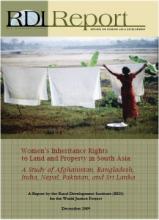Land Library Search
Through our robust search engine, you can search for any item of the over 73,000 highly curated resources in the Land Library.
If you would like to find an overview of what is possible, feel free to peruse the Search Guide.
/ library resources
Showing items 1 through 9 of 128.[From the editorial] This issue of Feminist Africa seeks to explore the interconnections among economic liberalisation policies, land and resource tenures, and labour relations in the structuring of gendered livelihoods in sub-Saharan Africa.
This is a 2009 study undertaken by the Rural Development Institute, now Landesa, and authored by Elisa Scalise.
The land management practices of pastoralist Maasai communities have a major bearing on landscapes and wildlife habitats in northern Tanzania. Pastoralists manage lands according to locally devised rules designed to manage and conserve key resources such as pastures and water sources.
Poor rural women are among the most vulnerable people in El Salvador, where the Reconstruction and Rural Modernization Programme was launched in 2003 to aid areas stricken by earthquakes two years earlier. Women’s land tenure was not initially a central theme of the programme.
[via UN-HABITAT] GLTN considers gender as a critical cross-cutting theme in the work on promoting pro-poor, large-scale land tools (for more information on GLTN see www.gltn.net).
This article is dedicated to the study the ways of appropriation of land in the south border of Brazil, in the first half of the century XIX. The historiography has, for tradition, associated the appropriation of large tracts of land, in Rio Grande do Sul, with royal donations.
Rural citizens have increasingly begun to invoke perceived citizenship rights at transnational level, such that rural citizen engagements today have the potential to generate new meanings of global citizenship.
This paper seeks to map out the historical trajectory leading to a series of migrations in and from the erstwhile princely state of Travancore during 1900-70 in order to acquire and bring land under cultivation.
In developing countries, forest management, sharing and collaboration has encountered major problems as reflected in Southern Cameroon’s forested landscape, which is challenged by differences in power, knowledge gaps, and competing land rights claims.







